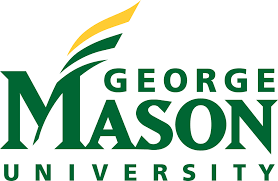George Mason University hosts Dell Technologies Education Innovation Summit at Mason Square
Experts and leaders in the fields of education and information technology came together at George Mason University to discuss how advances in the digital landscape can be harnessed to solve the unique challenges facing today’s educators and reinvent the classroom post-COVID. They were part of a two-day Dell Technologies Innovation Summit held in February at Mason Square in Arlington, Virginia.
people at the Dell Summit
From left, Provost Mark Ginsberg, Dell’s Tara Nattress, Michael Horn and Dean Ingrid Guerra-Lopez. Photo by Stephanie Aaronson/OUB
The summit included presentations and panel discussions examining how technology can play a key role in expanding instructional delivery methods to reach more students and thus create a more personalized learning experience for students. The event also provided teachers with opportunities for professional development and collaboration, and ways to maximize efficiencies and facilitate solutions to teachers’ problems of practice.
Provost Mark Ginsberg opened the summit with Tara Nattress, senior education strategist with Dell Technologies, who most recently served as assistant superintendent of teaching and learning for Arlington Public Schools. Ginsberg said this is an important moment in time following the pandemic, which pushed schools in terms of leveraging technology to teach and engage different learners. He emphasized the need to partner as we adapt to change and address gaps.
Award-winning education author Michael Horn gave a keynote talk, “Defining and Articulating What’s Possible.” Horn, co-founder of and a distinguished fellow at the nonprofit think tank Clayton Christensen Institute for Disruptive Innovation, frequently writes about the future of education and is widely recognized for his contributions on the topic of advancements in the use of technology in education.
Ingrid Guerra-López, dean of Mason’s College of Education and Human Development, delivered opening remarks on the second day highlighting how technology can influence society, the workplace, learning, and education. She also introduced a panel discussion on the role of artificial intelligence (AI) in education, featuring Shahnaz Kamberi, an associate professor in Mason’s Department of Computer Science, and leaders from Microsoft, ITSE, Discovery Education, and aiEDU.
Also on day two of the summit was the “Innovation Slam,” introduced by Kamaljeet Sanghera, executive director for Mason’s Institute for Digital Innovation (IDIA), and featuring examples of Mason’s innovative programs, including the Early Identification Program (EIP) for middle and high school students who will be the first in their families to attend college, CEHD’s School of Education’s learning technologies that are supporting students with disabilities and regional teachers to measure and improve blended teaching readiness, and College of Science’s Aspiring Scientists Summer Internship Program designed to help area high school students see themselves in STEM professions.
Representatives from Prince George’s County Public Schools, Winchester Public Schools, and Newport News Public Schools were also on hand to provide an overview of proposed initiatives within their respective school districts that use technology to build innovative learning models. School district leaders anticipate that implementation of these models will strengthen human capital, result in the increased effectiveness of teachers, and provide improved learning experiences for students.
Dell will be producing a white paper as a follow-up in the coming weeks.

